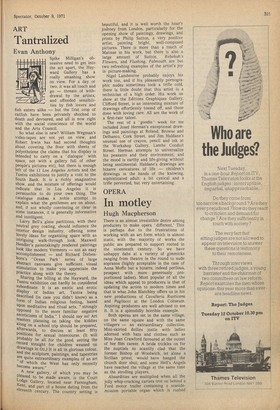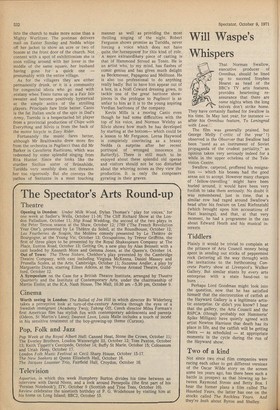OPERA
In motley
Hugh Macpherson
There is an almost irresistible desire among producers to make opera different.' This is perhaps due to the frustrations of working with an art form which is almost static, with the majority of works the public are prepared to support rooted in the nineteenth century. So we have unhappy dabs at a variety of gimmicks ranging from theatre in the round to nude sopranos (highly acceptable in the case of Anna Moffo but a bizarre, indeed perilous, prospect with more generously proportioned ladies). Most popular of all the ideas which appeal to producers is that of updating the action to modern times and that is what John Blatchley offers us in his new productions of Cavalleria Rusticana and Pagliacci at the London Coliseum. Aspiring producers are well advised to see it. It is a splendidly horrible example.
Both operas are set in the same village, on the same square and with the same villagers — an extraordinary collection. Mini-skirted dollies jostle with ladies adorned with hats and clothes such as Miss Joan Crawford favoured at the outset of her film career. A bride trickles on for the nuptials so scantily clad that the former Bishop of Woolwich, let alone a Sicilian priest, would have banged the church door shut; and some Hell's Angels have reached the village at the same time as the strolling players.
Absurdities are multiplied when all the jolly whip-cracking carters trot on behind a Ford motor trailer containing a seasidemission portable organ which is rushed
into the church to make more noise than a Mighty Wurlitzer. The postman delivers mail on Easter Sunday and Nedda whips off her jacket to show an acre or two of bosom at the front door of the church. Not content with a spot of exhibitionism she is soon rolling around with her lover in the middle of the same square, her husband having gone for a quick one — presumably with the entire village.
As for the villagers they are either permanently drunk, or it is a community for congenital idiots who go mad with ecstasy when Tonio turns up in a Fair Isle sweater and become positively hysterical at the simple antics of the strolling players. Principals fare little better. Canio is the fat Italian uncle of the spiv in Dad's Army, Turridu is a bespectacled bit player from a provincial production of Chips with Everything and Silvio is from the back of the motor bicycle in Easy Rider.
Fortunately the music fares better, although Mr Braithwaite drew more fire from the orchestra in Pagliacci than did Mr Barker in Cavalleria Rusticana, which was redeemed by some splendid singing from Rita Hunter. Since she looks like the sturdier Sicilian sister of Briinnhilde, Turiddu very sensibly does not threaten her too vigorously. But she conveys the pathos of Santuzza in a most touching manner as well as providing the most thrilling singing of the night. Robert Ferguson shows promise as Turiddu, never forcing a voice which does not have quite the horsepower for this kind of role. A more extraordinary piece of casting is that of Hammond Stroud as Tonio. He is an artist who, to my mind, has flashes of comic genius and has given much delight as Beckmesser, Papageno and Melitone. He is also too professional to do anything really badly. But to have him appear out of a box, in a Noel Coward dressing gown, to tackle one of the great baritone showpieces in the prologue to Pagliacci is as unfair to him as it is to the young aspiring Verdian baritones of the company.
Kevin Mills is a moving Canio even though he had some difficulties with the top of his voice, and Norman Welsby as Silvio shows how much he has developed by starting at the bottom— which could be a lesson to Mr Ferguson. Lorna Haywood is completely convincing as a brassy Nedda (a surprise after her recent portrayal of wronged innocence in Butterfly). There is still much to be enjoyed about these splendid old operas and visitors should not be too disturbed about the whirring noises as they view the production. It is only the composers gyrating in their graves.











































 Previous page
Previous page